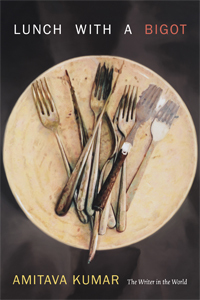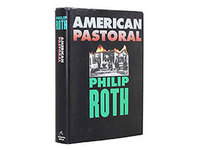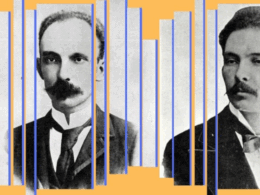
Our series of guest blog posts by writers of fiction, poetry, essays, and history continues today with a contribution by Amitava Kumar, whose new collection Lunch with a Bigot: The Writer in the World (Duke University Press, 2015) encompasses memoir, reportage, and criticism. Geoff Dyer praised Lunch with a Bigot as “stimulating, wide-ranging, learned, and funny—exactly what one wants from a book of essays.”
Below, Kumar expresses his admiration for Philip Roth’s ability to combine detailed observation with “the voluble, expressive sharing of rage, and sorrow, and befuddled despair.”
On the right side of my writing desk in my study is a black wooden bookshelf with thick, box-like sections where I keep books I need for my current projects. But on the wall in front, the wall that I face while I write, is a bookshelf on which are kept the books I know I will return to regularly. Those are the books that have made me who I am: they hold the key to the kind of writer I want to become. These titles are my personal classics. On the top of the shelf there is a boxed set of Paris Review interviews and the framed photographs of my two children, and below them, in the first row, a line of hardbound books in their white cardboard cases. These are the Library of America editions of Philip Roth’s writings.
I must have already read three or four novels of Roth’s before he became central to my thinking. Why did this happen? Perhaps the change occurred one night in Delhi. I was in my late thirties. By then I had published books of criticism, reportage, and a literary memoir. During a visit to India, the country of my birth, a young writer I admired took down Roth’s American Pastoral from his crowded bookshelf. We were sitting on the floor in his living room, drinking rum and coke. This writer is a man of unusual sensitivity and, although he downplays this part in conversation, he is a powerful editor of a national newspaper. He also stammers. From the page he had opened in American Pastoral, my friend began to read a passage which ended with the following words: “The fact remains that getting people right is not what living is all about anyway. It’s getting them wrong that is living, getting them wrong and wrong and wrong and then, on careful reconsideration, getting them wrong again. That’s how we know we’re alive: we’re wrong.”

I remember asking my friend to read the entire page again and, for my sake, he did so with many pauses. When I came back to the U.S., I bought a paperback copy of the novel. The lines that had been read to me in Delhi appear early in American Pastoral and what they catch quite effectively is a kind of shocked bewilderment in the face of angry social change. I’m talking now of the late 1960s in America. Roth’s novel is about the unsettling of middle-class notions of success and stability. But the above passage also presents a literary credo. Its essence was captured by Grace Paley when she argued that the writer, in contrast to the critic, writes not out of expertise but out of bafflement and urgent, unfailing interest. In an essay called “The Value of Not Understanding Everything,” Paley distinguished criticism from literature with disarming lucidity: “What I’m saying is that in areas in which you are very smart you might try writing history or criticism, and then you can know and tell how all the mystery of America flows out from under Huck Finn’s raft; where you are kind of dumb, write a story or novel, depending on the depth and breath of your dumbness.”
I like Roth for his monumental dumbness. His lack of understanding of the mystery that is his life—this also explains why he sometimes seems to be writing the same book again and again—is interesting because it is paired with a particularly male, even arrogant, set of certainties. The struggle for understanding is examined with great frankness. Roth generates enormous energy in American Pastoral by putting beside the voluble, expressive sharing of rage, and sorrow, and befuddled despair, an impressive array of precise observations. Think, for instance, of the detailed description of glove-making in Newark.
It’s not just that Roth’s characters can be so completely sure, and then so incredibly filled with doubt. Very few writers are capable of showing how they get things wrong, how they get themselves wrong. But let me make this argument by using Roth’s own words. Here is an anarchic poet named Ralph Baumgarten talking to Roth’s narrator, David Kepesh, in the novel The Professor of Desire: “For me the books count—my own included—where the writer incriminates himself. Otherwise, why bother? To incriminate the other guy? Best leave that to our betters, don’t you think. . . .”
English departments in this country are full of our betters. Roth teaches me to be a bit more honest.
Writer and journalist Amitava Kumar is Helen D. Lockwood Professor of English at Vassar College and a contributing editor at Guernica and Caravan. The author of several books of nonfiction and one novel, he sits on the board of the Asian American Writers Workshop and was recently awarded a residency at Yaddo. Edmund White has called Kumar “a sensitive, probing, erudite writer, always ready to question others and himself.”



